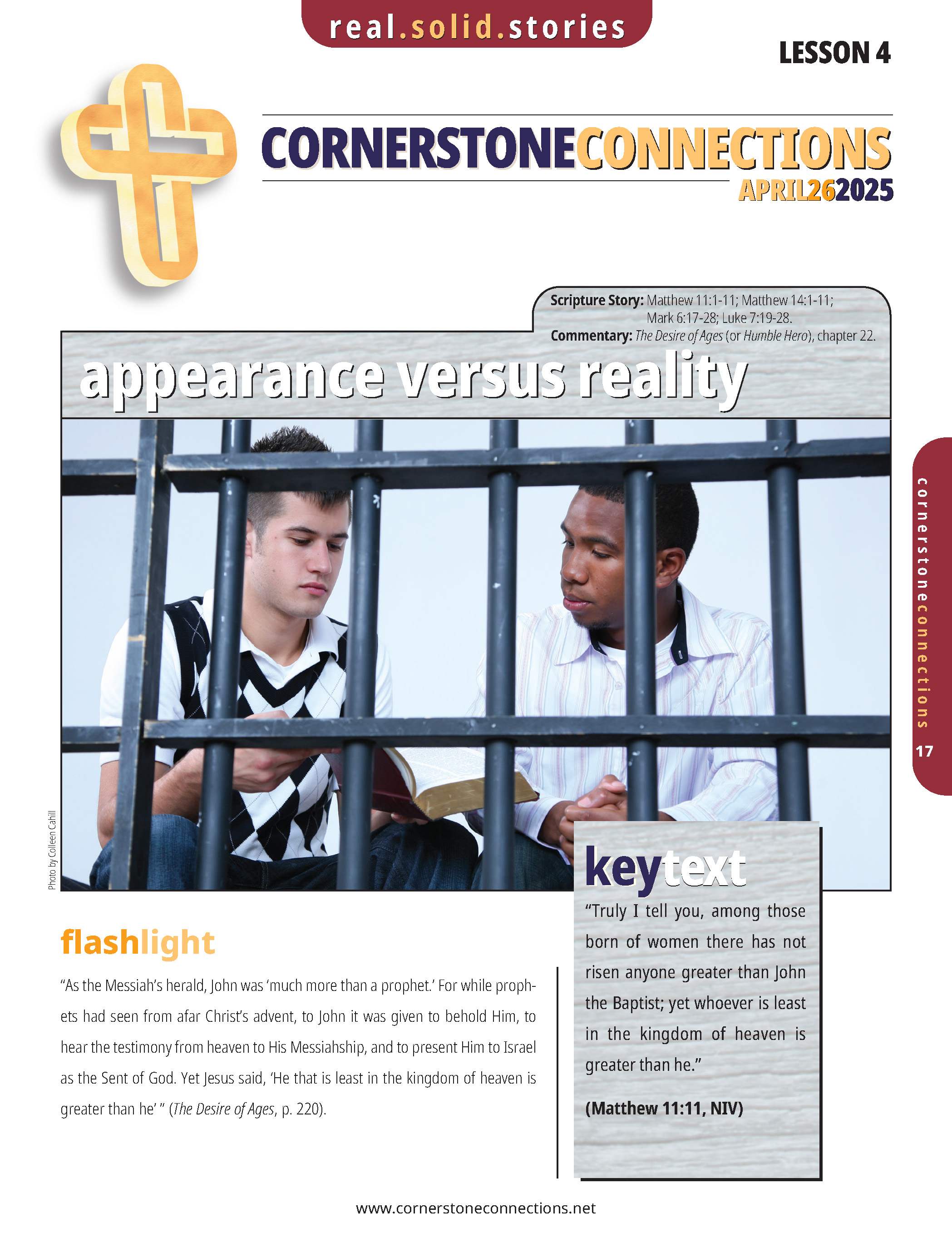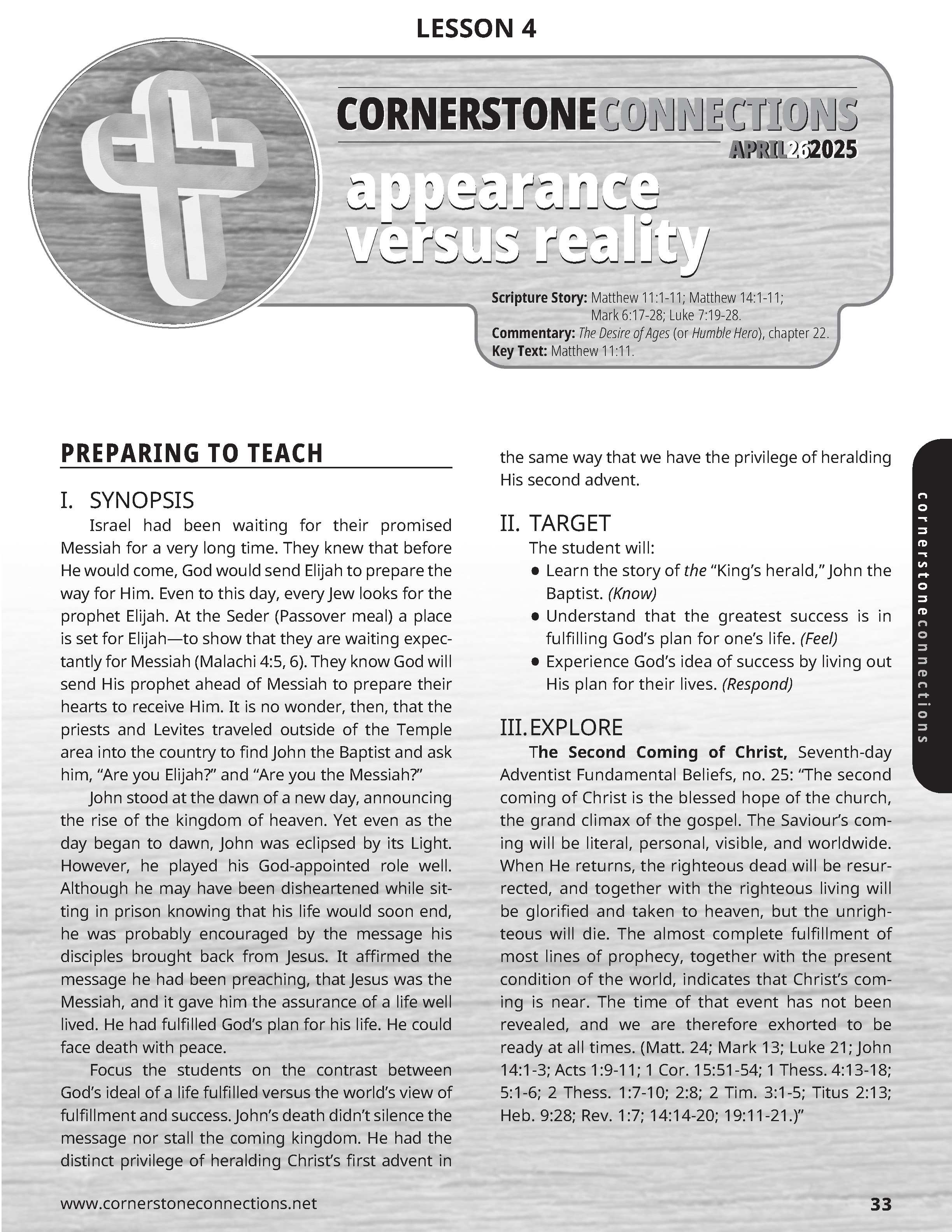Appearance Versus Reality
Click below to download the Cornerstone Connections leader’s guide and student lesson. This week’s resources also include two lesson plans and a discussion starter video which offer different ways of looking at the topic. Each lesson plan includes opening activities, scripture passages, discussion questions, and real-life applications.
John the Baptist had the incredible job of announcing that the kingdom of God was at hand. Unfortunately, he didn’t live long enough to see its ultimate fulfillment.
Matthew 11:1-11
Matthew 14:1-11
Mark 6:17-28
Luke 7:19-28
Humble Hero (Desire of Ages)
Chapter 22 - The Imprisonment and Death of John

John the Baptist served faithfully in his important job, the one God placed on his life as a prophetic calling. Meanwhile, Herod inherited his way into the powerful position of king. These two individuals both could be described as great, but who was actually great by God’s definition? Pride, carelessness, and drunkenness led to Herod being easily persuaded to execute John the Baptist. Power can go to a person’s head, and the attractions of pleasure and entertainment lead to life-altering mistakes—literally. Comparing and contrasting Herod and John the Baptist reveals the do’s and don’ts of being “employed” by God. What job description does God list for disciples? Disciples of Jesus learned from His example. Even today we are in the application process for working the most important job of all—sharing the gospel of God.
Supplies Needed: Internet access, paper, pencils
What is your dream job? Search on www.indeed.com for keywords that describe a job you think you would like to have someday. Take a look at the qualifications. Use the paper and pencils to take some notes about what you will need to do before you can work at that job. Draw a sketch on the paper of you working that job. List five bullet points of why you want to work at that job. If you don’t know what job you want to have in the future, just imagine some type of job (i.e. a parent or guardian’s career) to do this exercise. Dreaming and planning are the first steps toward reaching a goal. Discuss the following questions to brainstorm about your plans for success and your calling as a Christian.
The most important job description you can study is the one God gives in His Word. His idea of being the CEO is a lot different from what Bloomberg.com reports. You might not become the highest paid CEO in the US, Elon Musk of Tesla, who earns a $595,266,817* salary each year, but the things that money can buy will burn someday anyway. Although working to earn a living is an important part of life, as a Christian you have more than the things of this world to live for. You are chosen by God to make a positive difference in this world, while preparing yourself and others for eternal life.
Read each Bible passage, then discuss the questions. If you are still worshiping from home, consider discussing one or more of the questions on social media, in a Zoom meeting, or in a group chat with friends.
Read 1 Peter 2:9 (NIV).
9 But you are a chosen people, a royal priesthood, a holy nation, God’s special possession, that you may declare the praises of Him who called you out of darkness into His wonderful light.
Read John 13:34-35 (NIV).
34 A new command I give you: Love one another. As I have loved you, so you must love one another. 35 By this everyone will know that you are My disciples, if you love one another.
Read Matthew 11:29 (NIV).
29 Take My yoke upon you and learn from Me, for I am gentle and humble in heart, and you will find rest for your souls
Read this quotation from https://www.christianity.com/jesus/life-of-jesus/teaching-and-messages/the-yoke-of-jesus-biblical-meaning-and-importance.html:
“Let’s consider the context of Jesus’ words. Two oxen are chosen to share a yoke. The first is an older seasoned ox. He is trained and hardy from years of routine. The second is a new, young ox. He has potential but is inexperienced. By sharing the same yoke with a veteran workhorse, the elder trains the younger. Not only that, but the experienced one draws harder to bear the majority of the load. Since the older one leads, the younger ox does not have to wonder what to do. He learns from his mentor and gains the knowledge and skill to teach others. This very much resembles discipleship. Jesus invites us to ‘learn of Him’ which is another way of stating ‘be my disciple.’ There’s peace in not having to figure life out on our own. There’s assurance as we follow His lead. Jesus also declares that His yoke is easy. The word ‘easy’ here doesn’t imply ‘simple’, but ‘good’. If I’m yoked to Jesus, there’s peace in being yoked to someone good, loving, and patient.”
Read John 15:8 (NIV).
8 This is to My Father’s glory, that you bear much fruit, showing yourselves to be My disciples.
Read John 13:12-17 (NIV).
12 When He had finished washing their feet, He put on His clothes and returned to His place. “Do you understand what I have done for you?” He asked them. 13 “You call me ‘Teacher’ and ‘Lord,’ and rightly so, for that is what I am. 14 Now that I, your Lord and Teacher, have washed your feet, you also should wash one another’s feet. 15 I have set you an example that you should do as I have done for you. 16 Very truly I tell you, no servant is greater than his master, nor is a messenger greater than the one who sent him. 17 Now that you know these things, you will be blessed if you do them.
Consider applying what you learned in this week’s lesson.
Listen to Christian musicians Casting Crowns perform “Until the Whole World Hears” on YouTube:

LEADER’S NOTE
For a Relational Bible Study (RBS) you’ll want to get into the Scripture passage and encourage the youth to imagine participating in the story while it’s happening. Then you will be able to better apply it to your own situation today.
You will need to ask God for the Holy Spirit to be present as your small group discusses the questions (no more than 3-6 people in a group is recommended). Start with the opening question. It is a personal question and the answer is unique for each individual. There is no right answer and nobody is an expert here, so don’t be surprised when you hear different responses. You are depending on the Holy Spirit to be present and to speak through your group. Say what God prompts you to say, and listen to what others share.
Take turns reading the chapter out loud. Follow that with giving the students some time to individually mark their responses to the questions (a PDF version of the handout is available as a download). This gives each person a starting point for responding when you start to share as a group. Next, begin the discussion by asking the students to share what they marked and why on each question as you work your way through. Feel free to take more time on some questions than others as discussion warrants.
Encourage each person in the group to apply what is discussed to their personal lives and to share with the group what they believe God wants them to do. Then ask them to pray that God will help each of them to follow through in doing so. Remind them to expect that God will show them ways to live out the message of this passage in the coming week, and that they are free to ask others in the group to help hold them accountable.
John the Baptist was in trouble. Courageous man that he was, he had publicly rebuked Herod Antipas, ruler of Galilee, for his marital affairs. Herod had visited his brother in Rome and seduced his wife. He had then divorced his own wife and lured his sister-in-law to leave her husband and marry him. John had denounced this behavior and paid the penalty in a prison cell.
It is not surprising that he might have been tempted to doubt in prison. Everything tends to get out of proportion when you are suffering for a long time in a confined space, as John was. Doubts grow in such a soil. Wisely, he did not allow them to fester. He sent his disciples to speak directly with Jesus.
John also sent his disciples to Jesus for their own satisfaction. Jesus pointed them to what they heard and saw. Jesus’ gracious demeanor and compassion to the poor showed that He brought God’s tender mercies to the world.
Jesus bid John’s disciples to go and tell John what they heard and saw. And then Jesus launched into praise for John. He was not only a prophet, but the messenger that was to usher in the coming of the Lord.
John wanted his followers know for themselves who Jesus was. This was critical to them believing in Jesus’ mission on earth. Even though it seemed that John did not believe and was doubting, John knew the value of Jesus’ mission and wanted everyone to make a direct connection to His ministry.
Have you ever judged someone and found out that you were totally wrong?
Read Matthew 11:1-11.
1 After Jesus had finished instructing his twelve disciples, he went on from there to teach and preach in the towns of Galilee.
2 When John, who was in prison, heard about the deeds of the Messiah, he sent his disciples 3 to ask him, “Are you the one who is to come, or should we expect someone else?”
4 Jesus replied, “Go back and report to John what you hear and see: 5 The blind receive sight, the lame walk, those who have leprosy are cleansed, the deaf hear, the dead are raised, and the good news is proclaimed to the poor. 6 Blessed is anyone who does not stumble on account of me.”
7 As John’s disciples were leaving, Jesus began to speak to the crowd about John: “What did you go out into the wilderness to see? A reed swayed by the wind? 8 If not, what did you go out to see? A man dressed in fine clothes? No, those who wear fine clothes are in kings’ palaces. 9 Then what did you go out to see? A prophet? Yes, I tell you, and more than a prophet. 10 This is the one about whom it is written:
“ ‘I will send my messenger ahead of you, who will prepare your way before you.’
11 Truly I tell you, among those born of women there has not risen anyone greater than John the Baptist; yet whoever is least in the kingdom of heaven is greater than he.
1. Why did John ask a question about the deeds of the Messiah?
2. What was Jesus’ response?
3. What did Jesus say about John as his disciples were leaving?
4. What did Jesus mean when He said, “A prophet, yes more than a prophet”?
5. Why did Jesus tell the crowd, “John is the greatest born of women”?
6. Jesus said that the least in the kingdom is greater than John. Why?
7. What is the hardest part for you when you judge wrongly?
8. If you were in the crowd that day, how would you have responded to Jesus?
John was the predicted forerunner of Messiah (Malachi 3:1), especially chosen to introduce the Messiah to Israel. Consequently, no human being is greater than John. Jesus destroyed any suspicions of friction between himself and John. And anyone that is least in the kingdom of heaven is greater than John.
The kingdom of heaven is the Messianic kingdom announced by both John and Jesus. John, who was sent to prepare the way for Jesus, was now imprisoned and soon to die. But those who responded to John’s ministry and now followed Jesus were the nucleus of His kingdom. They were receiving new truths, and after national rejection of Jesus, would be baptized into a new spiritual body, the Church. John was the friend of the bridegroom, but the disciples became the bride.
We, by extension, represent the remnant of the kingdom. We have important roles in the scope of Christ’s mission here on earth. The crowd that Jesus spoke to is by extension all of us who are a part of His kingdom on earth today.
Have you ever heard the saying that things are not always what they appear to be? Have you ever felt as if you didn’t understand something, and it kept bugging you? How do you deal with unmet expectations? Below, find some application activities to reinforce this week’s lesson. Use these ideas as written, or as inspiration for creating your own.
1. Expert—Ease.
Create a short list of experts on your favorite subjects. (You could include your youth pastor or senior pastor.) Ask them questions about their area of expertise or even personal questions such as:
You can make up your own questions too. Then share with your class some of the responses you received, and discuss how the expert impacted you the most and why. Also, talk about John sending his disciples to ask Jesus, the expert, about what He knew about His area of expertise—the Messiah, Savior of the world.
2. “I Don’t Know!”
What do you do when the answer to a question or issue is, “I don’t know”?
3. Mind Readers?




